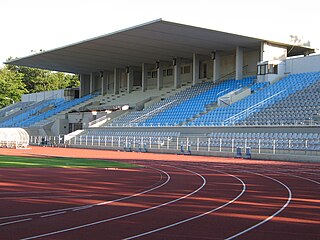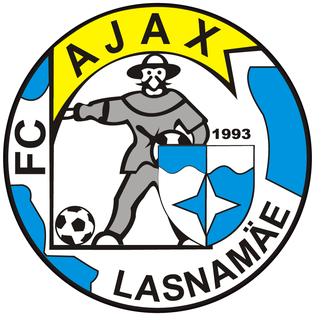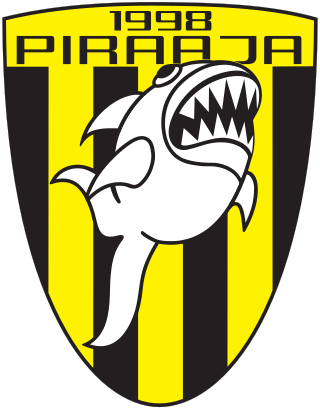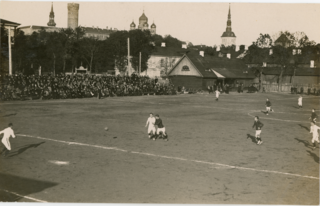
The Estonia national football team represents Estonia in international football matches and is controlled by the Estonian Football Association, the governing body for football in Estonia. Estonia's home ground is Lilleküla Stadium in the capital city Tallinn.

Meistriliiga is the highest division of the Estonian Football Association annual football championship. The league was founded in 1992, and was initially semi-professional with amateur clubs allowed to compete. With the help of solidarity mechanisms, the league is fully professional since the 2020 season.

Kalevi Keskstaadion is a multi-purpose stadium in Tallinn, Estonia. Opened in 1955 and having a capacity of 12,000, it is the traditional venue of the Estonian Dance Festivals and the home ground of JK Tallinna Kalev. The address of the stadium is Staadioni 8, 10132 Tallinn.

The Kadriorg Stadium is a multi-purpose stadium in Tallinn, Estonia. Opened in 1926, it is one of the oldest stadiums in Estonia. It is currently used mostly for track and field competitions, but also serves as a home ground for JK Tallinna Kalev. The stadium holds 5,000. The Kadriorg Stadium is located about 2 km east of the city centre in the subdistrict of Kadriorg near the Kadriorg Palace. The address of the stadium is Roheline aas 24, 10150 Tallinn.

FC Ajax Lasnamäe is an Estonian football club based in Tallinn. They play in the II Liiga East/North zone, the fourth division in Estonian football.

JK Tallinna Kalev, also known as Tallinna Kalev or simply Kalev, is a football club based in Tallinn, Estonia, that competes in the Meistriliiga, the top flight of Estonian football. The club's home ground is the Kalevi Keskstaadion.

Ida-Virumaa FC Alliance is an Estonian football club operating in Ida-Viru County. They play in the Esiliiga, the second highest level of Estonian football league pyramid. The club was created in 2012, when Kohtla-Järve JK Alko and Kohtla-Järve FC Lootus joined together. Before 2021, the team was called Kohtla-Järve JK Järve.

SK Tallinna Sport is a defunct Estonian football club. Founded in 1912, Sport won nine domestic league titles and was the most successful Estonian football club before Estonia became a part of Soviet Union.

JK Piraaja is Estonian football club based in Tallinn which was founded in 1998. It is one of the oldest football clubs in Estonia. Currently they are playing in the II liiga East/North, fourth-highest division in the Estonian football and Sportland Arena is their home stadion.

Tallinna JK or simply TJK is a defunct Estonian football club, based in Tallinn. Founded in 1921, TJK were one of the founding members of the Estonian Football Championship in 1921. On 4 January 2008 Tallinna JK and SK Legion Tallinn merged into Tallinna JK Legion.
The 2009 Meistriliiga was the 19th season of the Meistriliiga, Estonia's premier football league. It started on 7 March 2009 and ended on 10 November 2009. Levadia won their seventh title.
2009–10 Estonian Cup was the twentieth season of the Estonian football knockout tournament organized by Estonian Football Association. Winners of the cup qualified for the second qualifying round of the 2010–11 UEFA Europa League. The defending champions were Flora Tallinn.

Tallinna FC Olympic Olybet is an Estonian football club, playing in the town of Tallinn.
Johannes Brenner was an Estonia football forward, who played for ESS Kalev Tallinn, Tallinna Jalgpalli Klubi and the Estonia national football team.

JK Tallinna Kalev U21 is a football club based in Tallinn, Estonia. It is Tallinna Kalev's reserve team. They play their home games at artificial turf next to Kalev Central Stadium. Reserve teams in Estonia play in the same league system as their senior teams rather than a separate league. Reserve teams, however, cannot play in the same division as their senior team. Players can switch between senior and reserve teams.
Ave Pajo is an Estonian football player, who plays as a striker for Naiste Meistriliiga club Kalev Tallinn.
The 2015–16 Estonian Cup was the 26th season of the Estonian main domestic football knockout tournament. The cup holders, Nõmme Kalju, were knocked out in the Quarter-Finals by Sillamäe Kalev. Flora won their seventh title after defeating JK Sillamäe Kalev 3–0 in the final.
The 2018 Meistriliiga was the 28th season of the Meistriliiga, the highest division of Estonian football system. The season was scheduled to begin on 25 February 2018, but was postponed due to a cold wave. On 3 March, the season began with four out of five second round matches held in indoor arena. This marked the first time Estonian league football was played indoor. The season concluded on 10 November 2018. Flora were the defending champions. Nõmme Kalju won their 2nd Meistriliiga title completing an entire season undefeated.

Wismari Stadium is a football stadium in Tallinn, Estonia. Opened in 1916, it is the oldest existing football field in Tallinn. It currently serves as a training ground for TJK Legion. Wismari was the historic home ground of the nine-time Estonian champion Tallinna Sport during the first period of independence in Estonia.

Tiigiveski Ground was a football ground in Tallinn, Estonia. Opened in 1913, it was the first football specific ground in Tallinn and the first home for the Estonia national football team and for numerous Tallinn football clubs.




















